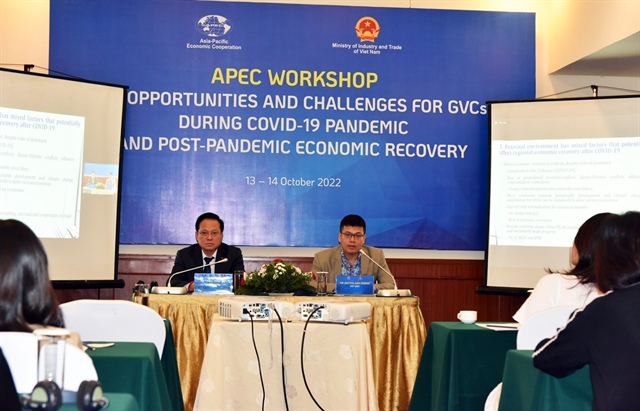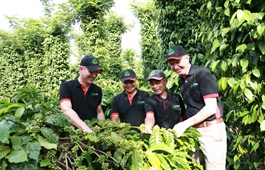Seeking new approach to global supply chains
Seeking new approach to global supply chains
The global supply chain seems unlikely to return to normal by the end of this year, according to experts who addressed a recent workshop in Vietnam on opportunities and challenges for global value chains in the post-pandemic recovery.
Supply chain disruption challenge
Workshop participants were told that due to the impacts of the COVID-19 pandemic, the global economy shrank 3.3 percent in 2020, although that rate could have been three times as high without the economic stimulus packages deployed by governments around the world. In addition, recent price hikes of energy and agricultural products have not only created pressure, but also affected the sustainable development of the global value chain, which, in turn, is also the cause of the global economic downturn.

A recent workshop in Vietnam on opportunities and challenges for global value chains in the post-pandemic recovery |
The Ministry of Industry and Trade official tasked with international economic integration, Trinh Minh Anh, said COVID-19 has posed unprecedented challenges to global value chains, with disruptions to both the supply of goods and services and people’s needs. In the early days of the pandemic, lockdown measures resulted in limited production and business activities, and disruption of supply and value chains.
“The regional and world economies face a huge shortage of intermediate input supplies for industries. This shock spread quickly and disrupted the expansion of the global supply chains that were quite stable after the financial crisis,” Anh said.
Future pandemics and impacts of the global economic recession, rising inflation and climate change are forecast to keep affecting the global economy in general and the supply chains of goods in particular, Anh warned.

COVID-19 contributes to the promotion of digitization and use of online platforms |
Flexible production network
However, in addition to the challenges, COVID-19 also provided opportunities for the global supply chain. Anh said it created a new impetus for building a more flexible production network and accelerating supply chain restructuring in the context of increasing protectionism.
Victoria Kwakwa, World Bank Vice President for Eastern and Southern Africa, has noted in the past that the pandemic also encouraged domestic enterprises to apply new technologies and upgrade business models, and accelerate digitization. For example, the lockdowns imposed on workers encouraged businesses to automate certain production and business stages, encouraged digitization and use of online platforms. Travel restrictions encouraged online sales and boosted e-commerce, allowing businesses to bring goods and services to new consumers. Digital transformation is now being accelerated to help businesses better adapt to recovery conditions.
Workshop participants agreed that this is also an opportunity for businesses and management agencies to shape a new approach to maintaining the global supply chain.
| Senior Analyst of the APEC Policy Support Unit, Akhmad Bayhaqi: Governments can promote digital transformation more strongly by completing digital transformation infrastructure and promoting e-commerce policies for the private sector, thereby helping businesses improve their resilience to the fluctuations of the global supply chain. |























